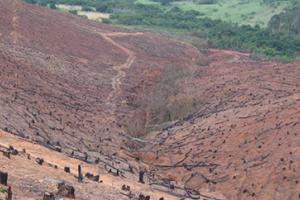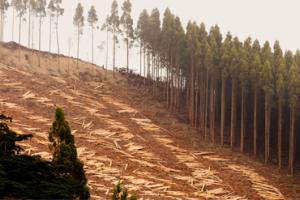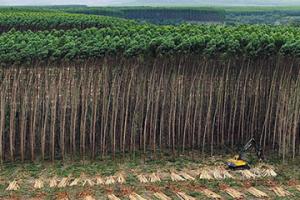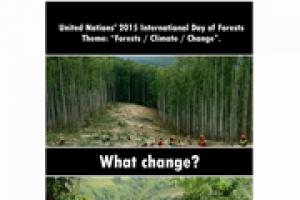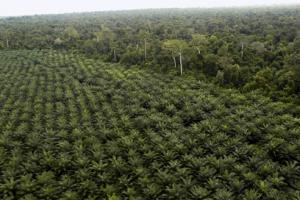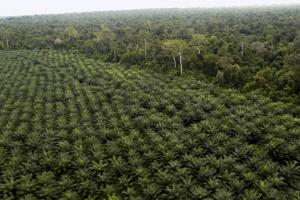Vast volumes of water are being misappropriated by “silent” thieves that operate 24 hours a day, 365 days a year. Corporations setting up monoculture plantations are the culprits, but, how can planted trees behave so differently from natural forests?
21/03/2018
Compilation of WRM Bulletin articles on the occasion of March 21st UN International Day of Forests
For decades, the WRM has demanded that the United Nation’s Food and Agriculture Organization (FAO) urgently reviews its forest definition, which mainly benefits the interests of industrial monoculture tree plantations companies. FAO’s definition reduces a forest to any area covered by trees. In doing so, the FAO definition discards other life-forms as well as the biological, cyclical and cultural diversity that define a forest in its continuous interconnection with forest-dependent communities. FAO’s reductionist definition also allows the companies behind tens of millions of industrial fast-growing plantations to claim their monocultures are “planted forests”. Countries’ forest statistics thus count these industrial monocultures as “forests”, in spite of the well-documented social and environmental impacts such plantations have caused around the world. The United Nations (UN) declared March 21st as the International Day of Forests in 2013. At the WRM, we are taking this day as another opportunity to expose FAO’s misleading forest definition. Already in 2009, the WRM denounced in its Bulletin 141 that: “the definition of forests is not an academic or linguistic discussion: it is a political issue having serious social and environmental consequences at the ground level. Defining plantations as forests empowers the corporate sector - particularly plantation companies - and disempowers local communities opposing them to protect their livelihoods. The FAO continues playing this role by refusing to change its definition.” FAO’s definition remains the most widely used forest definition today. It serves as a guide for national forest definitions worldwide – as we denounced in an Open Letter in 2017. It’s also the reference in international forums, such as the UN climate negotiations. Albeit speaking of forests, the 2016 UN Paris Agreement promotes the expansion of monoculture tree plantations in various ways. Tree plantations are promoted as so-called carbon sinks, dubious reforestation or restoration programmes are launched and wood is advertised as an energy source to replace fossil fuels. Because the Paris Agreement adopts FAO’s forest definition, its promotion of industrial tree monocultures is taking place under the guise of the positive image of forests. As the WRM, together with La Via Campesina, Friends of the Earth International and Focus on the Global South, stated in an Open Letter to FAO in 2014, “The definition fails the at least 300 million women and men worldwide who, according to FAO, directly depend on forests for their livelihoods.” The FAO should take full responsibility for the strong influence its forest definition has over global economic, ecological and social policies. Here we present a compilation of WRM Bulletin articles from 2015 until 2018 and further information that addresses the different impacts and consequences of FAO’s forest definition. We hope this compilation serves to underscore once again the importance for a change of the FAO’s definition. Plantations are not forests! Download the compilation here
Bulletin articles
6 May 2015
For a long time, WRM, along with other organizations and social movements, has denounced the certification of projects that are destructive to forests and their web of life. These projects have also proven to be detrimental to communities living in and depending on forests. The Forest Stewardship Council (FSC) certification not only legitimates industrial logging in tropical forests and vast areas of monoculture plantations, but has also been associated with carbon markets, by certifying trees planted for “carbon capture".
Bulletin articles
10 April 2015
For several years now the Food and Agriculture Organization of the United Nations (FAO) has celebrated the International Day of Forests on March 21. This year’s theme is: “Forests, Climate, Change.” But the changes we see that the FAO promotes only increase the problems of the peoples who depend on forests, such as the trend in Southern countries, like China, Malaysia, Brazil and Chile, to promote commercial plantations of genetically engineered trees.
Publications
20 March 2015
United Nations’ 2015 International Day of Forests. Theme: “Forests / Climate / Change”. What change?
Download as pdf here.
The aim of this document is to respond to this year’s campaign for March 21 carried out by the Food and Agriculture Organization of the United Nations (FAO). In a very short video, FAO highlights forests’ capacity to trap CO2 and suggests: “Sustainably managed forests are the frontline against climate change.”
Multimedia
20 March 2015
This two-minutes video is a rebuttal of the one-minute video produced by FAO for International Day of Forests.
The video aims to challenge the FAO video for March 21, which narrowly and erroneously views forests as if they were a “storage facility” for wood and carbon.
width="480" height="360" frameborder="0" allowfullscreen="allowfullscreen">
Bulletin articles
23 February 2015
The companies Forestal Mininco y Forestal Arauco account for the vast majority of tree plantation activities in Chile, with almost two million hectares of monoculture plantations of exotic tree species, mainly pine and eucalyptus. Despite the resistance, denunciations and harsh criticisms on the part of numerous Mapuche Indigenous organizations and communities, both companies have been certified with the FSC label through foreign consulting firms.
Action alerts
21 March 2014
The United Nations (UN) has declared March 21st as the International Day of Forests. For us a good reason to send once again a letter (see below) urging the Food and Agriculture Organization (FAO) of the UN to review its present definition of forests, that mainly benefits the interests of the timber, pulp and paper and rubber industries.
17 March 2014
The United Nations (UN) has declared March 21st as the International Day of Forests. For us a good reason to send once again a letter (see below) urging the Food and Agriculture Organization (FAO) of the UN to review its present definition of forests, that mainly benefits the interests of the timber, pulp and paper and rubber industries.
Action alerts
21 March 2013
On the occasion of March 21st, proclaimed by the UN General Assembly as International Day of the Forests (1), the World Rainforest Movement (WRM) and more than 300 signatories call on the General Assembly and UN Institutions and Initiatives related to forest issues to use the new initiative to address the underlying drivers of deforestation.
1 March 2013
On the occasion of March 21st, proclaimed by the UN General Assembly as International Day of the Forests (1), the World Rainforest Movement (WRM) and more than 300 signatories call on the General Assembly and UN Institutions and Initiatives related to forest issues to use the new initiative to address the underlying drivers of deforestation.
